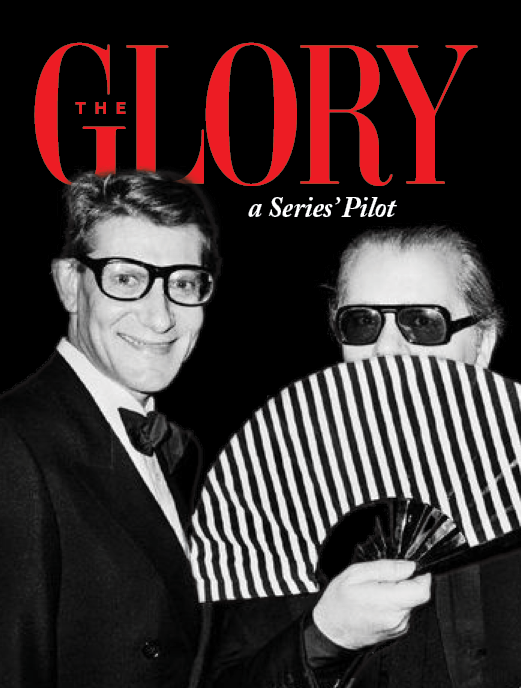The Glory
Pilot for a One-Hour Drama
Log Line: Two of fashion's most famous designers, Yves Saint Laurent and Karl Lagerfeld, battle for success, inspiration and love in the impossibly glamorous and decadent fashion world of mid-century Paris.
About: Original Screenplay for a one-hour drama series or limited series set in Paris in 1950s-1970s.
Download Script
“The Glory has a propulsive energy that swiftly moves through what might otherwise be rote, obvious bullet points in the early lives of both of these figures, filling every scene with a tonally consistent, wry, even sarcastic humor that never grates.”
–The Black List
Synopsis
THE GLORY is a dramatic television series inspired by the complicated friendship / rivalry between Yves Saint Laurent and Karl Lagerfeld as they each rise to the pinnacle of global fashion success. Set against the backdrop of France’s tumultuous, decadent, bloody — and heretofore rarely depicted in the English language — post-war decades, the series uses these fashion visionaries as windows into the social, political and economic issues with which the Western world continues struggles with today.
Season One (or limited series) takes place between 1955fand 1972. Set in Paris and Algeria, it follows the young designers early friendship as 20-something gay men from provincial backwaters, come to Paris to live their big city dreams. For Yves, it is a supersonic rise to fame and fortune when Christian Dior dies suddenly from a heart attack (a result of his eating disorder) and is crowned as head of the most famous couture house in the world. However, his charmed life comes to an abrupt end when his homeland of Algeria descends into a bloody, intractable war of independence from France. Saint Laurent, at age 23 is the most famous French-Algerian since Camus, and is drafted into the French army to fight for the remnants of a broken and deeply racist empire.
Meanwhile, Lagerfeld struggles with the more relatablechallenges of being smarter and harder-working than hissuperiors and constantly coming to odds with people whocannot, or will not see any writing on any wall, specifically, the fashion industry’s inevitable turn from couture to ready-to-wear. He is also hopeless with relationships,constantly allowing pretty young things to use him for his money, intelligence, and growing influence in the bel monde. This is due in part to his severe and abusive childhood in Germany. A loving, but VERY difficult mother looms LARGE.
After Yves has a nervous breakdown in army boot camp and is committed to a mental asylum, he emerges with his “loyal” partner, Pierre Berge, who is able to nurse him back to health and also help him start his own fashion house, YSL, which quickly becomes a huge success. Karl, too, while not famous outside of the fashion world, is becoming extremely wealthy as a “stylist” and a force in European fashion. The revolution of Mai ‘68 topples an entire government, but socialism and free love quickly give way to decadence, drugs, sex, glamour and a nightlife that puts the NYC disco era to shame. As Season 1 ends in the early 1970s, Yves and Karl have become notorious frenemies, each ruling over their own fashion fiefdoms. Rare are the people who are allowed to travel between camps. But there would be one man, a beautiful young aristocrat named Jacques de Bascher, who would come between the great men like nothing had before.
Narrated by the 20th century’s most visionary fashion editor, Diana Vreeland, THE GLORY is a fresh swim through the alchemy of art and commerce, the complicated and violent struggles of class and race, and the joys and traumas of following your dreams.
P.S. I wrote this 2020-2022. The opening historical vignette is Marie Antoinette’s execution, set to a jaunty anachronistic tune, which “coincidentally” was the opening scene in Ridley Scott’s Napoleon, which also used similar anachronistic music. I use scare quotes because Ridley’s assistant, who was working on Napoleon at the time, read my script in 2021 and commented on how much he liked my opening. Just saying!
Word on the Street




